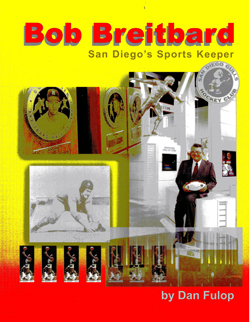Dan Fulop, Bob Breitbard: San Diego’s Sports Keeper,” AuthorHouse, (c) 2012; ISBN 978-1-4634-1020-9, 166 pages including notes and bibliography.
By Donald H. Harrison
 SAN DIEGO — Sportsman Bob Breitbard devoted his life to recognizing athletes and to making San Diego a professional sports town. He was the man who built the Sports Arena (now called the Valley View Casino Center) and brought to town the San Diego Gulls of the minor league Western Hockey League, and the San Diego Rockets of the National Basketball Association. He also conceived and developed the San Diego Sports Hall of Champions and the Breitbard Hall of Fame.
SAN DIEGO — Sportsman Bob Breitbard devoted his life to recognizing athletes and to making San Diego a professional sports town. He was the man who built the Sports Arena (now called the Valley View Casino Center) and brought to town the San Diego Gulls of the minor league Western Hockey League, and the San Diego Rockets of the National Basketball Association. He also conceived and developed the San Diego Sports Hall of Champions and the Breitbard Hall of Fame.
Relying on an exhaustive search of newspaper and magazine articles, author Fulop pulled together a comprehensive account of Breitbard’s accomplishments in these endeavors, as well as the travail that forced him to dispose of his interest in the arena, sell the Rockets to a sports consortium in Houston, and euthanize the Gulls. From my standpoint, these chapters were the most interesting in the book, earning Bob Breitbard: San Diego’s Sports Keeper a place on the shelves of local sports fans’ libraries.
The book, however, does have some flaws–some of which can be overcome if it ever goes to a second edition. The type font is unattractive, and there are typographical errors, as well as some embarrassing errors in spelling. For example, former City Attorney John Witt is rendered as “John Whit” and “whether” comes out “weather.” Such foul ups are not limited to Fulop; any writer can become distracted and make similar mistakes, however, better copy editing would have caught these errors prior to publication.
A larger problem with the book, at least from my point of view, is that there are very few primary sources, despite the fact that many friends and relatives of Breitbard are still living and are accessible here in San Diego. Had they been personally interviewed, they might have provided insights into the non-public aspects of Breitbard’s life. His fellow Jews in San Diego are aware that Breitbard came from a well respected family with a reputation for generosity. The Breitbards were longtime members of Tifereth Israel Synagogue.
Like Breitbard himself, author Fulop was fascinated with Ted Williams, who was a classmate of Breitbard at Hoover High School and a life-long friend. One of Breitbard’s proudest possessions–and later a key exhibit at the Hall of Champions museum in Balboa Park– was one of the bats that the Boston Red Sox slugger used in compiling a .406 batting percentage in 1941, the last time in Major League Baseball that anyone hit over the .400 mark.
Another important story retold in this book was how Breitbard brought Willie O’Ree, then nearing the end of his hockey career, to the San Diego Gulls, thereby familiarizing San Diegans with the athlete who was known as the “Jackie Robinson” of hockey, because O’Ree had been the first African-American to break into the NHL when he joined the Boston Bruins in 1958.
The Hall of Champions and its supporters were active in promoting all kinds of sports in San Diego, and the book tells of the successful drive to establish the annual college football Holiday Bowl. Adding to this group of devoted fans’ credit, a second bowl game, the Poinsettia Bowl, was subsequently inaugurated in San Diego.
Whether visiting the Hall of Champions in Balboa Park, attending an event at the Valley View Casino Arena, or remembering the days of Elvin Hayes, Calvin Murphy and other San Diego Rockets, thoughts are never very far distant about Bob Breitbard and his twin loves for sports and for the city in which he grew up. All quibbles aside, Fulop has done us a service with this book.
*
Harrison is editor of San Diego Jewish World. He may be contacted at donald.harrison@sdjewishworld.com